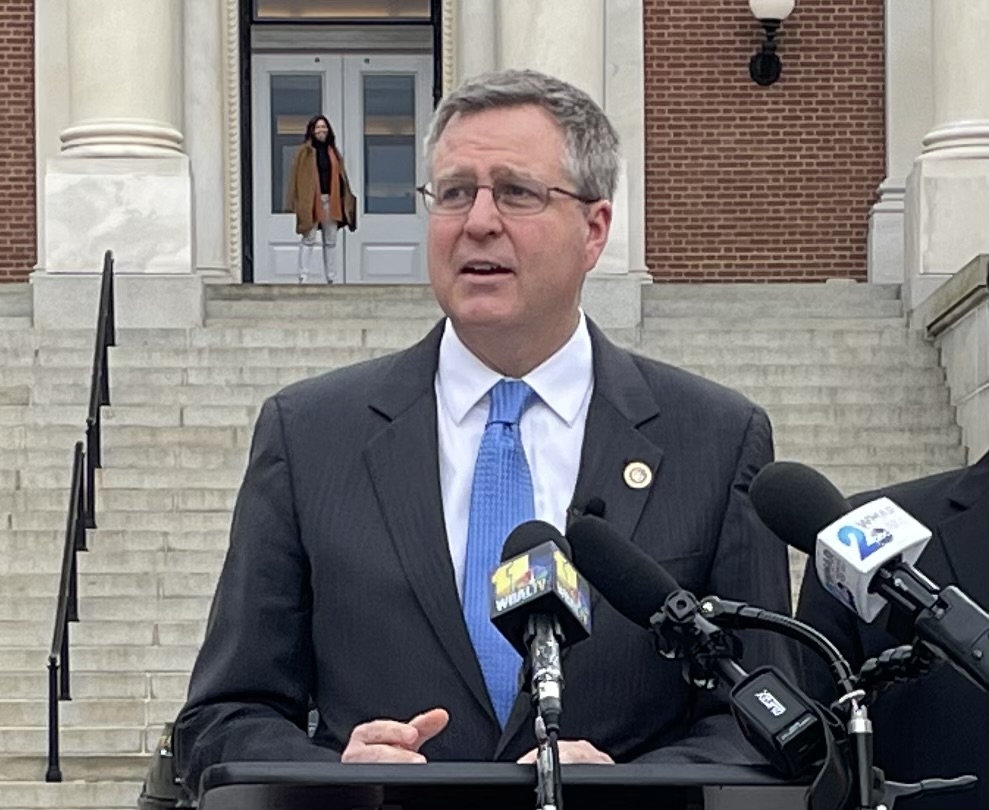Baltimore Ballot Explainer: Voters Could Reshape City Government
Although Election Day isn’t until Nov. 3, many Marylanders will be voting early or submitting their ballots by mail for the upcoming General Election. In many of the state’s largest jurisdictions, voters will be met with lengthy ballots and multiple local initiatives to consider. In Baltimore City, there are 11 ballot issues to be decided by voters.
If you’re still trying to request a mail-in ballot, or want to know how to register to vote, you can check out our guide for voters here.
If you want to find out where to drop off your ballot, or where you can vote in-person this November, you can take a look at our interactive voting center maps here.
Want to see a sample ballot for your county? The State Board of Elections has a list of every approved ballot for the November election on its website.
Here’s a quick breakdown of the ballot questions in the city:
Question A
This bond issue would allow Baltimore officials to borrow up to $12 million for the city’s affordable housing program. The borrowed money would be used to support the city’s Affordable Housing Trust Fund, to demolish blighted properties and for a slew of other affordable housing measures.
Question B
This bond issue would allow city officials to borrow up to $38 million to modernize existing school buildings and to build new ones.
Question C
This bond issue would allow officials to borrow up to $38 million for the city’s community and economic development programs. These programs include dealing with blight in the city and incentivizing new development through loans and grants.
Question D
The final bond measure of Baltimore’s ballot would let city officials borrow up to $72 million for public infrastructure, including renovating public buildings and repairing streets in the city.
Question E
This measure would amend the city’s charter to include a Charter Revision Commission, which would be appointed at least once every 10 years to revise Baltimore’s charter. The city’s mayor, comptroller and city council president would each appoint three commission members, while each member of city council would appoint one member, according to the proposed amendment.
The commission would be required to hold a public hearing about its proposed changes, and would ultimately report its findings to the mayor and city council.
Question F
This charter amendment would increase the Baltimore City Council’s spending power, allowing the council more control over the city’s budget. If the amendment passes, council members could increase spending within the city’s general fund or add new spending items, with certain limitations.
The city council can already cut the city budget proposal, but only the mayor can reallocate funding. Council members pushed the amendment through earlier this year following a battle with Mayor Bernard C. “Jack” Young (D) over spending, The Baltimore Sun reported.
Question G
This amendment would make it easier for the Baltimore City Council to override a mayoral veto. Under the amendment, two-thirds of council would need to vote to override a veto instead of the current three-fourths.
The ballot question also contains erroneous information about stripping the mayor of line-item veto powers. Baltimore City Council members removed that language from the ballot, but a mistake by the city’s law department means the language remains on the ballot.
Voters who receive mail-in ballots will get an insert about the error, and notices will be posted at the city’s in-person voting booths.
Question H
This amendment would increase the amount of time Baltimore City Council has to override a mayoral veto. Currently, council members have between five and 20 days from the date a veto is read to the council to override it. This amendment would add that, if no city council meeting is scheduled within the five to 20 day period, the city council can override the mayor’s veto at their next meeting.
Question I
This amendment would create a standard process by which the Baltimore City Council could remove an elected official from office. If this amendment passes, the city council would be able to remove officials, including the council president, mayor or comptroller, by a three-fourths vote.
Under the proposed amendment, the council could remove those officials due to “incompetency, misconduct in office, willful neglect of duty, or felony or misdemeanor in office, on charges brought by the mayor, the City Council Committee on Legislative Investigations, or by the Inspector General.” The amendment requires the council to give those officials an opportunity to be heard before their removal.
The amendment would also allow the council to consider removal of the mayor, comptroller or city council president if presented with a petition signed by 20% of registered voters in the city.
Question J
This amendment would allow the city auditor to issue subpoenas “to any municipal officer, municipal employee, or any other person receiving City funds” to produce documents. It would also require the auditor to provide copies of agency audits to the agencies that were audited.
Question K
This would create a city administrator position in the city. The city administrator would be appointed by Baltimore’s mayor, and would oversee the day-to-day operation of the city.
Brandon M. Scott, the Democratic nominee for mayor and current city council president, argues the position will professionalize city government and keep politics out of the operation of the city. His detractors, including former mayors, argue that the position could reduce mayoral power. The administrator would ultimately report to the mayor, Scott said, and could be fired at any time.




 Creative Commons Attribution
Creative Commons Attribution